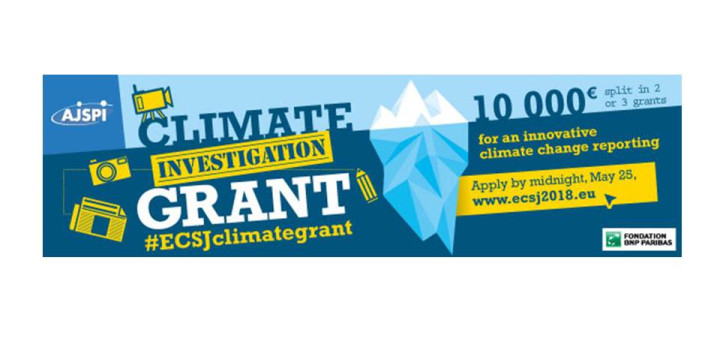Supporting ambitious field investigations focused on understanding of the climate
The French Association of Science Journalists (AJSPI) and the BNP Paribas Foundation launched their first climate investigation grant for European science journalists. The climate investigation grant was created in 2018 with the aim of supporting ambitious field investigations focused on understanding of the climate, adaptation to climate change, or on different mitigation strategies. It also aims to encourage transnational, collaborative and transmedia projects. It is exclusively reserved for professionals (print, radio, TV, web...), members of a national association of science journalists, based in Europe. There is no linguistic restriction on the language in which the winning projects are subsequently published.
16 projects, 26 journalists and 14 European countries
For this first edition of the Climate Grant Investigation, 16 projects were submitted by 26 journalists from 14 different countries. The jury was very impressed with the quality of the grant proposals. It proved that science reporters from all across the East, West, North and South of Europe are finding intriguing and powerful stories to tell about climate change.
The winners were announced on July 8th, during the 5th European Conference of Science Journalists, in Toulouse (France):
- Olga Dobrovidova (Russia), Tidal Current, 3,000 euros
Tidal power is a bit of an enigma; the first tidal power plant, La Rance in France, became operational in 1966 — yet fifty years later this renewable energy source is still very rarely used as one can realistically visit every tidal power plant in the world. Is there an economic case to be made for tidal energy today or in the near future? What was the thinking behind the 1960s projects and how have they withstood the test of time? What does an Arctic tidal power station look like? The Tidal Current project is a multimedia investigation which aims to explore this technology all across the world, with a particular focus on the environmental and climate footprint.
- Vera Novais (Portugal) and Michele Catanzaro (Spain), Grassroots for climate, 3,550 euros
In Europe, Spain and Portugal are among the most vulnerable areas to the impact of climate change. Nevertheless, the financial crisis has hampered the capacity of state and companies to undertake ambitious adaptation and mitigation actions. The Grassroots for climate project wants to investigate whether community-led initiatives may be a solution to tackle this problem. Besides writing compelling stories of success, failure and creativity in coping with climate change, the project will talk with experts in environment, economy, and energy, to assess the impact of these initiatives and to report on research done on grassroots initiatives’ success, challenges and limitations.
- Slobodan Bubnjević, Marija Đurić and Nikola Zdravković (Serbia), A Regional Map of Climate Skepticism, 6,000 euros
As part of ongoing EU accession, countries in the Western Balkans region are strengthening their climate policies to reach EU climate targets. They are also, to a certain extent, trying to raise public awareness on the topic. However, at the same time, climate change skepticism has quickly overwhelmed the local media landscape. Is the rising climate change skepticism in the region a grassroots phenomenon, or is it pushed and lobbied for by interested parties? The Regional Map of Climate Skepticism will investigate the background mechanisms of these various anti-climate actions around the region.
The jury was composed of renowned science journalists and experts on climate change:
- Jacopo Pasotti (Switzerland-based science and environment writer and photographer);
- Mićo Tatalović (science journalist and news editor from Croatia, chairman of ABSW);
- Lise Barnéoud (French science journalist, AJSPI);
- Franck Courchamp (France based researcher working on the effects of climate change on biodiversity and ecosystems, CNRS), laureate of the BNP Paribas’ Climate initiative program in 2014 and member of the Foundation’s scientific committee;
- Friederike Otto (Deputy Director of Environmental Change Institute, University of Oxford), laureate of the BNP Paribas’ Climate initiative program in 2016.
Press contacts:
Renato Martinelli Renato.martinelli [at] bnpparibas (dot) com +33 (0)1 58 16 84 99
Florence Bardin florence.bardin [at] agencef (dot) com 01 82 83 81 90 – 06 77 05 06 17
Lise Barnéoud contact.ajspi [at] gmail (dot) com
The Association of Science Journalists (AJSPI) brings together professional journalists specialising in scientific and technical information. It aims to: promote better scientific information; promote the principle of free access to sources of scientific information; undertake initiatives aimed at giving scientific information its rightful place in all general media; foster the best possible collaboration between researchers and journalists; ensure that research organisations, both public and private, and businesses respond positively to journalists’ needs for information; undertake initiatives that facilitate the practice of its members’ profession; participate in international unions of science journalists and collaborate with international sister-associations.
Under the aegis of the Fondation de France, the BNP Paribas Foundation has been playing a key role in corporate philanthropy for 30 years. It also coordinates BNP Paribas Group’s international philanthropic growth in all countries where the bank does business.
The BNP Paribas Foundation’s actions are part of a multi-disciplinary approach to philanthropy aimed at promoting innovative projects dedicated to culture, solidarity and the environment. The BNP Paribas Foundation pays close attention to the quality of its commitment to its partners, with the goal of supporting their projects over the long term. Since 1984, it has supported more than 300 cultural projects, 40 research programmes and a thousand social and educational initiatives in France and throughout the world.
Since 2010, the BNP Paribas Foundation has been developing the Climate Initiative, a philanthropic programme dedicated to improving awareness on the climate, climate deregulation, and to assessing the consequences for our environment. With a three-year budget of €6 million (2017-2019), the programme will finance eight projects selected by an international scientific committee comprising recognised researchers (Philippe Gillet, Joanna Haigh, Jean-Pascal Ypersele, Thomas Stocker, Riccardo Valentini, Corinne Le Quéré, Franck Courchamp). A total of 178 researchers, professors and engineers from 73 universities and research centres across five continents are involved.
All the projects receiving support are presented on the BNP Paribas Foundation website and YouTube channel.


